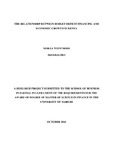| dc.description.abstract | This was a descriptive study undertatken with the aim of assessing the relationship between
budget deficit financing and economic growth in Kenya. It was guided by three research
objectives; to evaluate the influence of deficit financing on economic growth, to find out the
effect of human capital creation on economic growth and to establish the relationship between
the country’s investment and economic growth. It applied the use of secondary data which was
collected from government reports and publications on economic growth and deficit financing
from 2002- 2012 given on quarterly basis. The analysis of the data involved Co-integration tests,
Granger causality tests and Vector Auto Regression (VAR) model method to analyze the
regression model. The significance of the results was tested at 5% level by the use of t-test and ftest
for the model significance test. The findings indicated that, deficit financing have a great
effect on the economic growth of a nation as a budget deficit implies lower taxes and increased
government spending which will increase aggregate demand and this may cause higher Real
GDP and inflation. Increased investments on resourceful activities like industrial production are
vital in determining the ability of a nation to achieve economic growth. The study therefore
suggests that, greater budgeting discipline that will reduce wastage in government expenditure
should be encouraged in the nation and that the government should redirect its fiscal policy that
would favor the private investor by discouraging high government expenditure and maintaining
low fiscal deficit. The study was however limited by the use of secondary data which limits its
findings in reliability as explaining the accurate picture of the phenomenon under study.
Therefore the research suggests areas for further studies including; the impact of pressure from
external shocks and political uncertainty to foreign investments which are sources of revenue and
stimulates of economic growth. | en_US |

